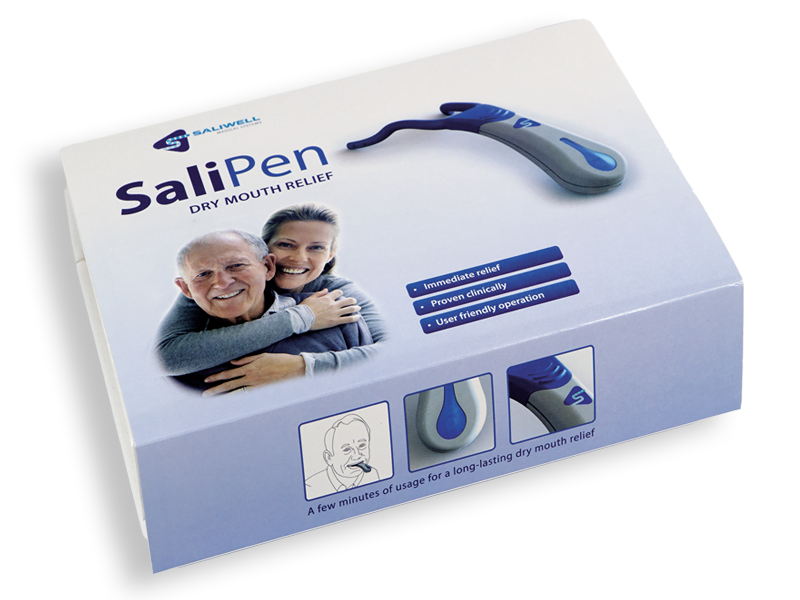
Info on dry mouth
Dry mouth: its causes and treatments
Info on dry mouth
Dry mouth: its causes and treatments
There are several other ways that may help if you have dry mouth. The most common are:
Gum, lozenges or mints
The combination of chewing and taste, as provided by these aids can be effective in lessening mouth dryness.
Medication from your doctor
There are medications that specifically increase salivary flow, such as pilocarpine and cevimeline. However these drugs may cause significant adverse side effects.
Mouthwash, spray or gel
A number of salivary substitutes/artificial saliva agents are available as mouthwash, spray or gel.
What causes dry mouth?
There are several major known causes for dry mouth.
People get dry mouth when their salivary glands in the mouth, responsible for making saliva, are not working properly and do not secrete enough saliva.
Common causes
- Alzheimer’s disease
- Medication-induced side effect
- Autoimmune disease (Sjögren’s syndrome)
- Head & neck radiotherapy
- Bone marrow transplantation
Common side effects
- Depression
- Chronic Hepatitis C
- HIV infection
- Drug abuse
- Others or unknown (idiopathic) causes
Why are my salivary glands not working properly?
Different reasons can cause your salivary glands to produce little or no saliva:
Side effects of some medicines
More than 1,800 medicines can cause the salivary glands to make less saliva. Among the medication classes that may cause dry mouth are:
- Analgesics
- Anorexiants
- Anti-Arrhythmic Medications
- Anti-Ulcer Agents
- Anticholinergics and Antispasmodics
- Antihistamines and Decongestants
- Antihypertensives
- Cold and Cough Preparations
- Digestives
- Diuretics
- Erectile Dysfunction Management
- Gastrointestinal Agents
- Immunologic Agents
- Migraine Management
- Muscle Relaxants
- Nausea Medications
- Osteoporosis Management
- Parkinsonism Drugs
Psychotropic Agents:
- Antianxiety Agents
- Antidepressants
- Antimanic Agents
- Antipsychotic Agents
- Obsessive-Compulsive Medication
- Sedative and Hypnotic Agents
- Seizure Disorder Medication
- Sleep Aids
- Smoking Cessation Aids
- Treatment of Attention Deficit / Hyperactivity Disorder
Disease
More than 1,800 medicines can cause the salivary glands to make less saliva. Among the medication classes that may cause dry mouth are:
Radiation therapy
The salivary glands usually are damaged by radio-therapy during cancer treatment.
Nerve damage
Injury to the head or neck can damage the nerves that tell salivary glands to make saliva.
Other causes of dry mouth
In addition, many cases of dry mouth are due to other causes not listed here, or may be of unknown origin (idiopathic).
What are the dry mouth symptoms?
The most common symptoms of dry mouth include a dry or sticky mouth, frequent thirst, sore throat, difficulty speaking, altered taste, bad breath, and difficulty chewing or swallowing.
Symptoms may include:
- a sticky, dry feeling in the mouth
- trouble chewing, swallowing, tasting, or speaking
- a burning feeling in the mouth
- a dry feeling in the throat
- cracked lips
- a dry, rough tongue
- mouth sores
- an infection in the mouth
- bad taste
- bad breath (halitosis)
- need to moisten the mouth often (including during the night)
Will my dry mouth go away? Is it occasional, or chronic?
Dry mouth can be an occasional feeling due to dehydration if not enough fluids are drunk or in severe cases of diarrhea or vomiting.
Dry mouth can also appear as a reaction to the intake of certain medications, like anti-histamines used against allergy or codeine taken to combat pain or cough.
Dry mouth can also be the consequence of a transient anxiety or depression.
However, if dry mouth is felt constantly on most days of the week and this condition lasts for over one month, then a chronic form of dry mouth is suspected and you should consult with your doctor.
Why is saliva so important?
Saliva acts in the mouth like oil does in an engine.
The tongue and lips cannot function smoothly without enough saliva. Thus, one finds it hard to speak and chew food, especially dry and hard food.
Worse than that, one may not get the needed nutrients if chewing and swallowing certain foods are hampered.
In addition, tooth decay or other infections in the mouth can develop.
How does saliva keep us healthy?
- Saliva helps digesting food
- Saliva protects teeth from decay
- Saliva lubricates the mouth and allows free movement of the jaws and tongue
- Saliva prevents infection by controlling bacteria and fungi in the mouth
- Saliva prevents infection by controlling bacteria and fungi in the mouth
- Saliva makes it possible for you to chew and swallow
- Saliva prevents bad breath
What should I do or not do if my mouth is dry?
- Sip water or sugarfree drinks more often.
- Avoid drinks with caffeine, such as coffee, tea, and some sodas. Caffeine can dry out the mouth.
- Sip water or a sugarfree drink during meals. This will make chewing and swallowing easier. It may also improve the taste of food.
- Be aware that spicy or salty foods may cause pain in a dry mouth.
- Chew sugarfree gum or suck on sugarless hard candy to stimulate saliva flow; citrus, cinnamon or mint-flavored candies are good choices.
- Don’t use tobacco or alcohol. They dry out the mouth.
- Use a humidifier at night.
How do I care for my teeth when I have dry mouth?
Remember, if you have dry mouth (xerostomia), you need to be extra careful to keep your teeth healthy. Make sure you:
- Gently brush your teeth at least twice a day.
- Floss your teeth every day.
- Use toothpaste with fluoride in it. Most toothpastes sold at grocery and drug stores have fluoride in them.
- Avoid sticky, sugary foods. If you do eat them, brush immediately afterwards.
- Visit your dentist for a check-up at least twice a year. Your dentist might give you a special fluoride solution that you can rinse with to help keep your teeth healthy.

SaliPen® dry mouth treatment
Increase saliva production for dry mouth relief by gentle stimulation.

